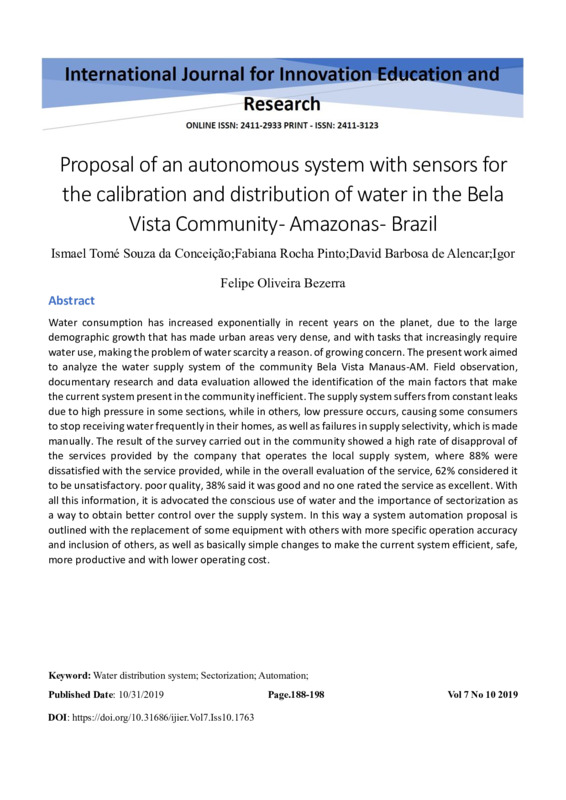Proposal of an autonomous system with sensors for the calibration and distribution of water in the Bela Vista Community - Amazonas - Brazil
Item
-
Tipo do ITEM
-
Artigo Ciêntifico
-
Título do Artigo
-
Proposal of an autonomous system with sensors for the calibration and distribution of water in the Bela Vista Community - Amazonas - Brazil
-
Descrição
-
Abstract
Water consumption has increased exponentially in recent years on the planet, due to the large
demographic growth that has made urban areas very dense, and with tasks that increasingly require
water use, making the problem of water scarcity a reason. of growing concern. The present work aimed
to analyze the water supply system of the community Bela Vista Manaus-AM. Field observation,
documentary research and data evaluation allowed the identification of the main factors that make
the current system present in the community inefficient. The supply system suffers from constant leaks
due to high pressure in some sections, while in others, low pressure occurs, causing some consumers
to stop receiving water frequently in their homes, as well as failures in supply selectivity, which is made
manually. The result of the survey carried out in the community showed a high rate of disapproval of
the services provided by the company that operates the local supply system, where 88% were
dissatisfied with the service provided, while in the overall evaluation of the service, 62% considered it
to be unsatisfactory. poor quality, 38% said it was good and no one rated the service as excellent. With
all this information, it is advocated the conscious use of water and the importance of sectorization as
a way to obtain better control over the supply system. In this way a system automation proposal is
outlined with the replacement of some equipment with others with more specific operation accuracy
and inclusion of others, as well as basically simple changes to make the current system efficient, safe,
more productive and with lower operating cost.
Keyword: Water distribution system; Sectorization; Automation;
-
Abstract
-
Abstract
Water consumption has increased exponentially in recent years on the planet, due to the large
demographic growth that has made urban areas very dense, and with tasks that increasingly require
water use, making the problem of water scarcity a reason. of growing concern. The present work aimed
to analyze the water supply system of the community Bela Vista Manaus-AM. Field observation,
documentary research and data evaluation allowed the identification of the main factors that make
the current system present in the community inefficient. The supply system suffers from constant leaks
due to high pressure in some sections, while in others, low pressure occurs, causing some consumers
to stop receiving water frequently in their homes, as well as failures in supply selectivity, which is made
manually. The result of the survey carried out in the community showed a high rate of disapproval of
the services provided by the company that operates the local supply system, where 88% were
dissatisfied with the service provided, while in the overall evaluation of the service, 62% considered it
to be unsatisfactory. poor quality, 38% said it was good and no one rated the service as excellent. With
all this information, it is advocated the conscious use of water and the importance of sectorization as
a way to obtain better control over the supply system. In this way a system automation proposal is
outlined with the replacement of some equipment with others with more specific operation accuracy
and inclusion of others, as well as basically simple changes to make the current system efficient, safe,
more productive and with lower operating cost.
Keyword: Water distribution system; Sectorization; Automation;
-
Língua do arquivo
-
inglês
-
Data da Publicação
-
Ano 2019
-
Palavra-chave
-
Water distribution system
-
Sectorization
-
Automation
-
Autores
-
Ismael Tomé Souza da Conceição
-
Fabiana Rocha Pinto
-
David Barbosa de Alencar
-
Igor Felipe Oliveira Bezerra
-
Local
-
ITEGAM - Manaus, 2019


